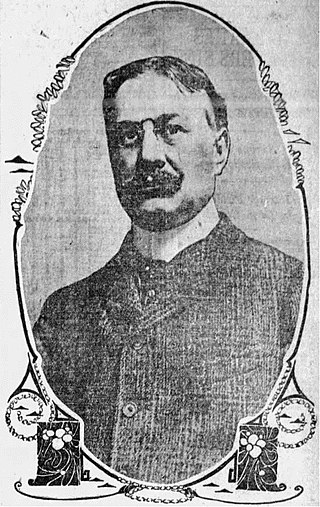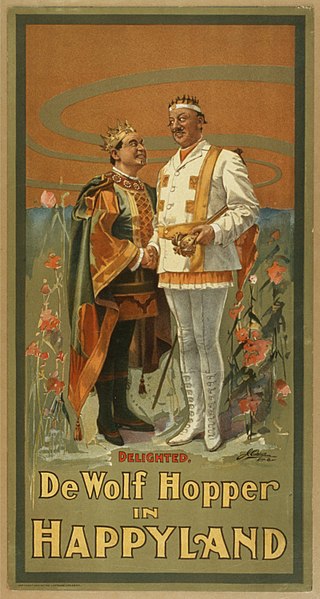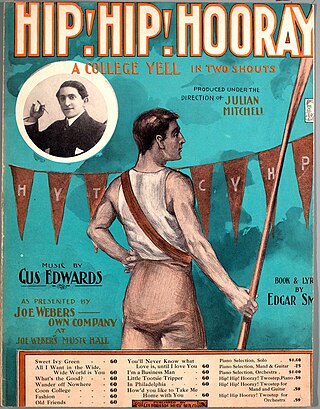Related Research Articles
Mam'zelle Champagne was a musical revue set in Paris with book by Edgar Allan Woolf, music by Cassius Freeborn, produced by Henry Pincus, which opened June 25, 1906. On opening night at the outdoor Madison Square Garden Roof Theatre, millionaire playboy Harry K. Thaw shot and killed architect Stanford White: the otherwise undistinguished musical's run continued for some 60 performances largely on the publicity from this incident.

Gustave Adolph Kerker, sometimes given as Gustav or Gustavus Kerker, was a Kingdom of Prussia-born composer and conductor who spent most of his life in the United States. He became a musical director for Broadway theatre productions and wrote the music for a series of operettas and musicals produced on Broadway and in the West End. His most famous musical was The Belle of New York (1897).

The Wizard of the Nile is a comic opera in three acts with music by composer Victor Herbert and a libretto by Harry B. Smith. This was Herbert's second comic opera after Prince Ananias, and was his first real success.

Mary Arnaud "May" Naudain was an American musical theatre actress and singer.

Along Fifth Avenue is a revue in two acts with sketches by Charles Sherman and Nat Hiken; music by Gordon Jenkins, Richard Stutz, Milton Pascal and Hiken; and lyrics by Tom Adair, Stutz, Pascal and Hiken. It was produced on Broadway in 1949.
Louis De Lange, also known as Louis De Lange Moss was an American playwright, actor, and theatrical manager. As a stage actor he primarily appeared in light operas and musicals; notably portraying Sir Joseph Porter in the original production of John Philip Sousa's pirated version of Gilbert and Sullivan's H.M.S. Pinafore in Philadelphia, on Broadway and on tour in 1879. As a dramatist he mainly wrote the books for musicals; often in collaboration with writer Edgar Smith on projects created for the comedy duo Lew Fields and Joe Weber. De Lange also worked as Fields and Weber's manager for their national tours. His wife was the Broadway actress Selma Mantell who appeared in the Ziegfeld Follies among other Broadway shows. Their son was the bandleader and lyricist Eddie DeLange.

Louis Harrison was an actor, playwright, comedian, lyricist, librettist, and theatre director. As both a performer and playwright, he was mainly active within the genres of musical theatre and light opera.
Ernest Albert, born Ernest Albert Brown, was an American painter, illustrator, muralist, and scenic designer. He was a prolific scenic designer, first in Saint Louis and Chicago and then on Broadway. He is considered a major American landscape painter and was elected the first president of the Allied Artists of America in 1919.
Jack O'Lantern is a musical in two acts and 8 scenes with music by Ivan Caryll and both lyrics and book co-authored by Anne Caldwell and R. H. Burnside. The work also included some additional songs with music by Irving Berlin, Shelton Brooks and Gus King; and lyrics by Louis Harrison and Benjamin Hapgood Burt.
The Billionaire is a musical in three acts with music by Gustave Kerker, and both book and lyrics by Harry B. Smith. The show was written with the backing of producers Klaw and Erlanger and was made specifically for the talents of Jerome Sykes who portrayed "The Billionaire", John Doe. The action of the musical begins in Nice, France during Carnival where the billionaire Sykes meets a young American girl, Pansy Good, studying to be an actress. Impressed with her talents, he buys her Doe's Theatre in New York City and establishes her as a star. Later, Doe attempts to ride a horse in a race at the Longchamp Racecourse in Paris, but is too fat to succeed. Pansy rides the horse instead and wins the race.

Happyland, Or, The King of Elysia is a comic opera in two acts with music by Reginald De Koven and a libretto by Frederic Ranken.
Frederic G. Ranken was an American librettist, lyricist, and playwright for light operas and musicals staged on Broadway from 1899 through 1907. His greatest success was the libretto for Reginald De Koven's 1905 comic opera Happyland. He also wrote libretti for composers Victor Herbert and Ludwig Engländer, and was a lyricist for composers Alfred Baldwin Sloane and Gustave Kerker among others. As a playwright he wrote the books for several musicals.
The Gingerbread Man is a musical in two acts with music by A. Baldwin Sloane and both book and lyrics by Frederic Ranken. Described by the creators as a "Fanciful Fairyesque", the work was essentially a Christmas musical with Santa Claus and Mrs. Claus serving as the heroes of the piece.
Coming Thro' The Rye is a "satiretta" or musical in two acts with both lyrics and book by George V. Hobart and music by A. Baldwin Sloane and J. Sebastian Hiller.
Gates and Morange was a New York City based firm of designers and builders established in 1894 by brothers Frank E. Gates and Richard H. Gates, and the artist Edward A. Morange. The firm had a prolific career as scenic designers for Broadway from the 1890s through the 1930s; creating sets for more than 50 productions. The firm also created designs for trade shows, exhibitions, and businesses. While the organization's work as set designers ended after the mid-1930s, the firm continued to operate in other capacities until it closed in 1953.
Roderic Campbell Penfield was an American publisher, printer, editor, journalist, theatre critic, businessman, playwright, and lyricist. The author of several plays, including both book and lyrics for multiple musicals, two of his stage works were mounted on Broadway: Lady Teazle (1904) and The White Hen (1907). During his varied career in media, he worked as journalist and editor for the New-York Tribune, The Sun, and the New York Evening Mail; also working as a theatre critic for the latter paper. From 1912 to 1914 he was managing editor of Harper's Weekly. Also a businessman with media interests, he was for a time the co-owner of the Asbury Park Press with his brother, Norman W. Penfield. The brother also co-owned the pioneering news photography company, the Pictorial News Company of New York.
Paul West was an American playwright, lyricist, newspaper editor, journalist, screenwriter, author, and talent agent. After working as a journalist in Massachusetts from 1888 to 1892, he began his career in the theatre as a press representative for Charles H. Hoyt; followed by a season as the business manager for the opera singer and actress Camille D'Arville and the comedian Frank Daniels. From 1898 to 1911 he worked on the editorial staff The New York Sunday World during which time be began a career as a prolific lyricist for both Broadway musicals and Tin Pan Alley publishers of popular song; publishing more the 500 songs during his lifetime. He also worked as a playwright, penning both plays and the books for several musicals. More than 15 of his stage works were mounted on Broadway between the years 1902–1913. In 1904 his children's book The Pearl and the Pumpkin was published; a work which he later adapted into a 1905 musical.

Hip! Hip! Hooray! is a musical in two acts with music by Gus Edwards and both lyrics and book by Edgar Smith. It was written as a starring vehicle for the comedian Joe Weber. It premiered on Broadway at Weber's Music Hall on October 10, 1907. It ran at that theatre for 64 performances; closing on December 7, 1907. The plot takes place at the fictional Doolittle College where two German professors attempt to popularize a new breakfast cereal, "Excited Oats", while simultaneously getting entangled into their own individual romances; one with a widow and the other with a beautiful young woman.
Leona Stephens, also known as Leona Hollister, Leona Stephens Hollister, Leona Hollister West, and Leona Stephens Hollister West, was an American actress, vaudeville performer, playwright, and songwriter who had an active career on stage and radio during the first half of the 20th century.
Otis C. Sheridan was an American character actor who had a five decade long career on the stage from the 1890s into the early 1940s. He made his Broadway debut in 1901 as Ludwig Dollar in Thomas Q. Seabrooke's revival of the musical The Rounders. He appeared in several more Broadway musicals and plays into the late 1930s, and was also active in regional theatre until his retirement from the stage in 1941. In addition to a career in the theater, he appeared in the films The Night Angel (1931) and Sweet Surrender (1935).
References
Citations
Bibliography
- Bordman, Gerald Martin; Norton, Richard (2010). American Musical Theatre: A Chronicle. Oxford University Press. ISBN 9780199729708.
- Dietz, Dan (2022). "The White Hen". The Complete Book of 1900s Broadway Musicals. Rowman & Littlefield Publishers. ISBN 9781538168943.
- Letellier, Robert Ignatius (2015). Operetta: A Sourcebook, Volume II. Cambridge Scholars Publishing. ISBN 9781443885089.
- Mantle, Burns; Sherwood, Garrison P.; Chapman, John Arthur (1944). "The White Hen". The Best Plays of 1899-1909. Dodd, Mead & Co.